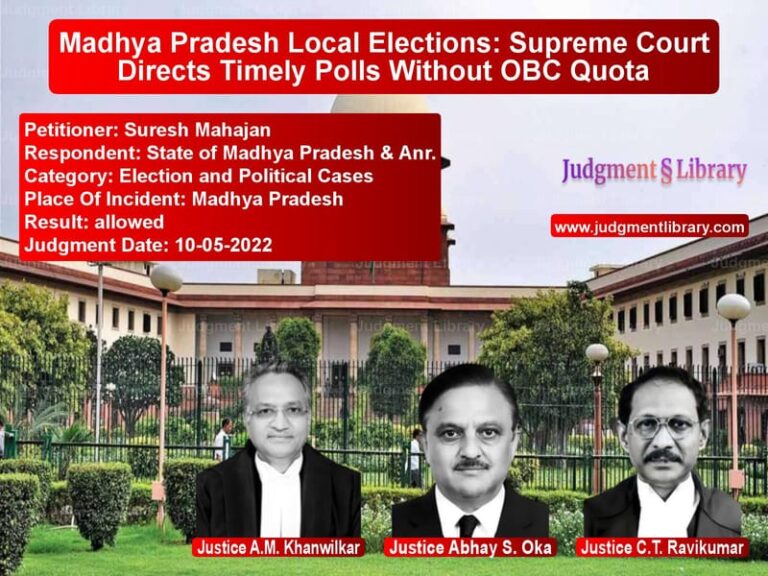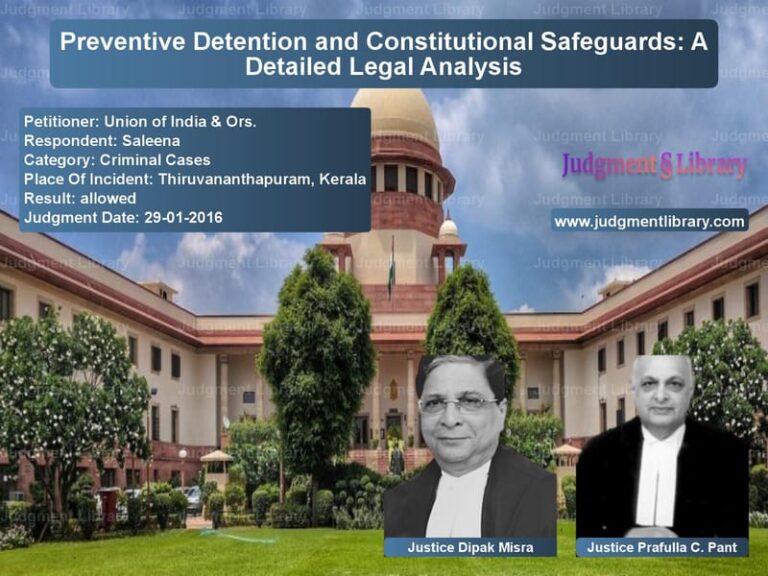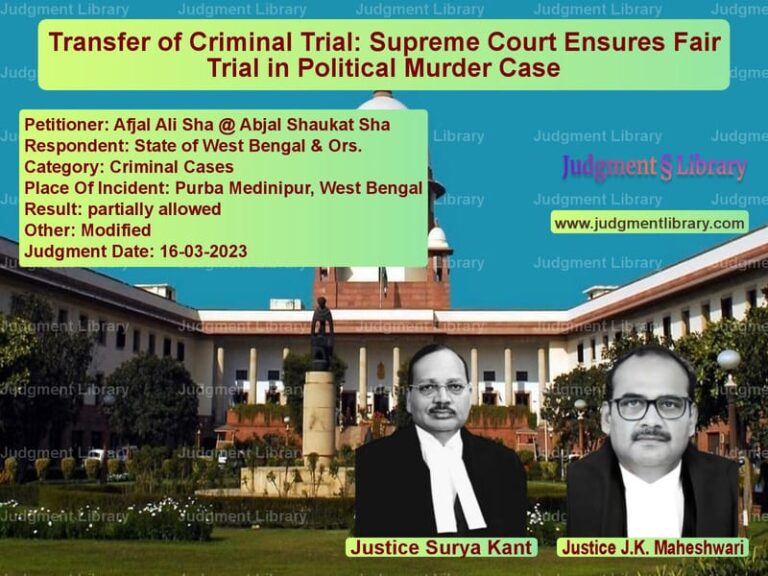Dowry Death Conviction Restored: Supreme Court Overturns High Court’s Acquittal in Bride Burning Case
The Supreme Court of India recently delivered a significant judgment in the case of State of Madhya Pradesh vs. Jogendra & Another, reinstating the conviction of a husband and father-in-law for the dowry death of a young woman who was five months pregnant at the time of her tragic demise. The Court held that the High Court erred in acquitting the accused and restored their conviction under Sections 304-B and 498-A of the Indian Penal Code (IPC).
Background of the Case
Geeta Bai, an 18-year-old woman, was married to Jogendra on May 7, 1998. Within four years of her marriage, she died due to severe burns after setting herself on fire at her matrimonial home. She was admitted to the Community Health Centre, Baroda, on April 20, 2002, and succumbed to her injuries on the same day. At the time of her death, she was five months pregnant.
The deceased’s maternal uncle, Bansi Lal (PW-1), and other family members testified that she was harassed and subjected to cruelty due to persistent dowry demands made by her husband (Jogendra) and father-in-law (Badri Prasad). According to their statements, the accused demanded ₹50,000 for house construction, which the victim’s family was unable to provide.
Trial Court Conviction
The Additional Sessions Judge found both Jogendra and Badri Prasad guilty under Sections 304-B (dowry death), 306 (abetment of suicide), and 498-A (cruelty to a married woman). The trial court sentenced them to:
- Life imprisonment for dowry death under Section 304-B IPC.
- Seven years’ rigorous imprisonment under Section 306 IPC.
- Three years’ rigorous imprisonment under Section 498-A IPC.
High Court Acquittal
On appeal, the High Court of Madhya Pradesh overturned the conviction under Sections 304-B and 306 IPC. The High Court concluded that:
- The demand for ₹50,000 for house construction did not qualify as dowry under the Dowry Prohibition Act, 1961.
- The prosecution failed to prove that the accused had abetted the suicide of the deceased.
- Jogendra’s conviction under Section 498-A IPC was upheld, but his sentence was reduced to the period already undergone.
- Badri Prasad was acquitted of all charges, including Section 498-A IPC.
Supreme Court’s Observations
The Supreme Court bench comprising Chief Justice N.V. Ramana, Justice A.S. Bopanna, and Justice Hima Kohli disagreed with the High Court’s reasoning. The Court reinstated the convictions under Sections 304-B and 498-A IPC, ruling that:
“The High Court fell into an error by holding that the demand of money for construction of a house cannot be treated as a dowry demand. Such a restrictive interpretation defeats the very purpose of Section 304-B IPC.”
Key Legal Findings
- Demand for Money as Dowry: The Supreme Court clarified that any property or valuable security demanded after marriage falls within the ambit of dowry if it is connected with the marriage.
- Dowry Death Presumption: Under Section 304-B IPC and Section 113-B of the Indian Evidence Act, a presumption arises against the accused when a woman dies an unnatural death within seven years of marriage due to cruelty or harassment related to dowry.
- ‘Soon Before Death’ Concept: The phrase ‘soon before’ does not mean ‘immediately before.’ It refers to a period close enough to the death to establish a link between the cruelty and the death.
Final Judgment
The Supreme Court ruled:
“The conviction and sentence imposed by the trial court under Section 304-B and Section 498-A IPC is restored. However, the sentence of life imprisonment is modified to seven years of rigorous imprisonment, which is the minimum sentence prescribed under Section 304-B IPC.”
Implications of the Judgment
This ruling strengthens the legal framework for dowry death cases by:
- Expanding the definition of dowry to include post-marriage financial demands.
- Reaffirming that courts must interpret dowry-related laws broadly to curb social evils.
- Ensuring that acquittals are not granted on technical grounds when overwhelming evidence of cruelty exists.
Conclusion
The Supreme Court’s judgment in State of Madhya Pradesh vs. Jogendra serves as a landmark ruling in dowry death cases. By reinforcing the importance of a broad interpretation of dowry laws, the decision upholds justice for victims of domestic cruelty and dowry harassment.
Petitioner Name: State of Madhya Pradesh.Respondent Name: Jogendra & Another.Judgment By: Justice N.V. Ramana, Justice A.S. Bopanna, Justice Hima Kohli.Place Of Incident: Madhya Pradesh.Judgment Date: 11-01-2022.
Don’t miss out on the full details! Download the complete judgment in PDF format below and gain valuable insights instantly!
Download Judgment: state-of-madhya-prad-vs-jogendra-&-another-supreme-court-of-india-judgment-dated-11-01-2022.pdf
Directly Download Judgment: Directly download this Judgment
See all petitions in SC/ST Act Case
See all petitions in Bail and Anticipatory Bail
See all petitions in Contempt Of Court cases
See all petitions in Judgment by N.V. Ramana
See all petitions in Judgment by A. S. Bopanna
See all petitions in Judgment by Hima Kohli
See all petitions in allowed
See all petitions in Modified
See all petitions in supreme court of India judgments January 2022
See all petitions in 2022 judgments
See all posts in Criminal Cases Category
See all allowed petitions in Criminal Cases Category
See all Dismissed petitions in Criminal Cases Category
See all partially allowed petitions in Criminal Cases Category







